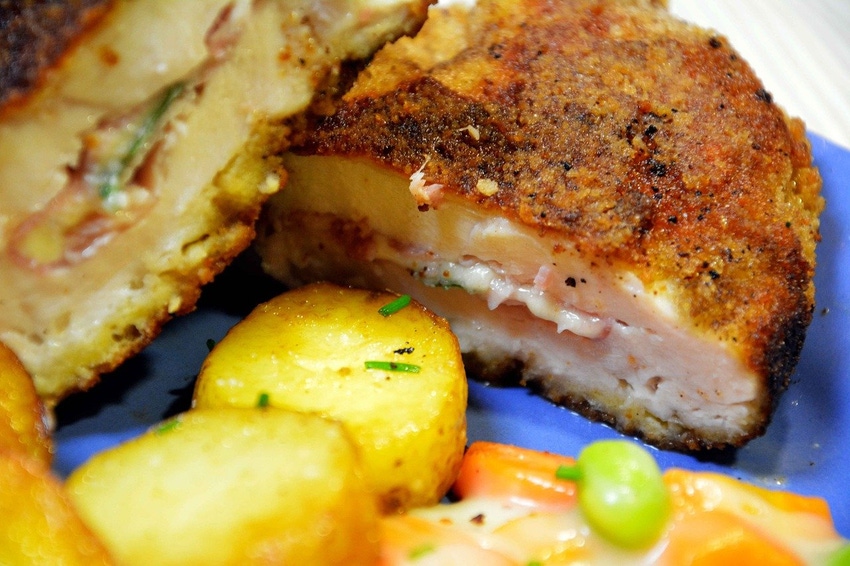Group says policy has potential to shutter processing plants, cost jobs and drive up costs for consumers.

The National Chicken Council (NCC) expressed grave concern today with USDA’s Food Safety and Inspection Service (FSIS) proposed determination to declare Salmonella an adulterant in breaded stuffed raw chicken products when they exceed a very low level of Salmonella contamination. USDA said the announcement “is a significant first step” that builds on FSIS’ proposed regulatory framework to reduce Salmonella infections linked to poultry products, released in October 2022. Contrarily, NCC said the “abrupt shift in longstanding policy has the potential to shutter processing plants, cost jobs, and take safe food and convenient products off shelves, without moving the needle on public health.”
The Centers for Disease Control and Prevention (CDC) estimates that Salmonella bacteria cause approximately 1.35 million human infections and 26,500 hospitalizations in the United States every year. Of those infections, over 23% are attributed to poultry consumption. Data from USDA’s Economic Research Service (ERS) show the total cost for foodborne Salmonella infections in the U.S. is $4.1 billion annually and the cost for the loss of productivity to the economy is $88 million.
“USDA is taking science-based, decisive action to drive down Salmonella illnesses linked to poultry products,” said Agriculture Secretary Tom Vilsack. “Today’s proposal represents the first step in a broader effort to control Salmonella contamination in all poultry products, as well as a continued commitment to protecting American consumers from foodborne illness.”
Under te proposal, FSIS would consider any breaded stuffed raw chicken products that include a chicken component that tested positive for Salmonella at 1 colony forming unit (CFU) per gram prior to stuffing and breading to be adulterated. FSIS is also proposing to carry out verification procedures, including sampling and testing of the chicken component of breaded stuffed raw chicken products prior to stuffing and breading, to ensure producing establishments control Salmonella in these products. If the chicken component in these products does not meet the standard, the product lot represented by the sampled component would not be permitted to be used to produce the final breaded stuffed raw chicken products. The chicken component represented by the sampled lot would need to be diverted to a use other than breaded stuffed raw chicken products.
As the products often appear ready to eat, but contain raw chicken, NCC said it recognizes their nature raises special considerations that merit additional attention. However, NCC President Mike Brown said millions of dollars have been invested and decades of work has been dedicated to developing and refining best practices for these products to reduce Salmonella and protect public health.
“These efforts have been paying off, demonstrated by a significant decline in illnesses over the past seven years,” he said, adding that there has been one outbreak associated with these products since 2015.
NCC estimates that on an annual basis, over 200 million servings of this product will be lost, 500-1,000 people will lose their jobs, and the annual cost to industry is significantly higher than USDA’s estimates. It is also likely that this proposal would drive smaller producers of this product out of business entirely, the organization said.
Brown commented, “This administration has prioritized addressing concerns with food availability and affordability. This proposal would undermine these goals by driving up food costs, reducing the supply of convenient, nutritious chicken, and forcing lower-income consumers of these products to purchase more expensive alternatives.
Equally concerning is that USDA’s announcement was not science-based and not driven by data, risk assessments, product testing or scientific analysis, he added.
“Going back to the passage of the Poultry Products Inspection Act in 1957, the mere presence of Salmonella has not rendered raw poultry adulterated. We believe FSIS already has the regulatory and public health tools to work with the industry to ensure the continued safety of these products. We’ve been asking the agency for years to collaborate on these efforts, including two petitions for stricter regulations, requests that have gone largely ignored.”
Brown said there is no silver bullet or one-size-fits all approach to food safety, which is why a multi-stage strategy is used. “The only way to ensure our food is safe 100% of the time is by following science-based procedures when raising and processing chicken, and by handling and cooking it properly at home.”
NCC said it remains confident breaded stuffed chicken products can be prepared and consumed safely, “and the industry remains committed to continuing their efforts to further enhance the safety of these products.”
About the Author(s)
You May Also Like





